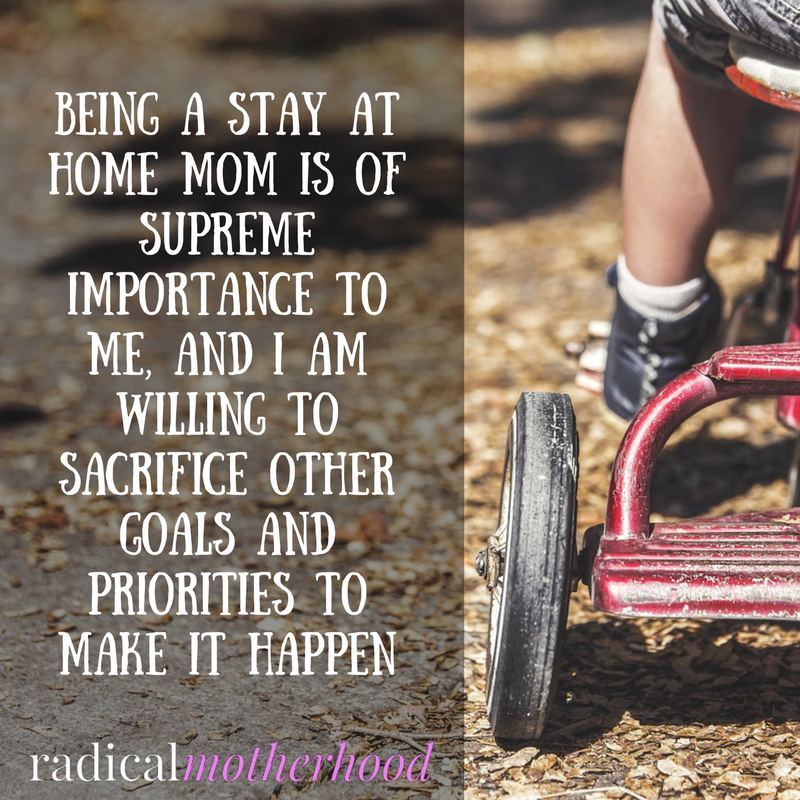Can you afford to live on one income? Can you afford not to?
Nearly every time I tell someone that I’m a stay-at-home mom, I hear one of these two responses:
- I wish I could afford to do that. We just can’t make it on my husband’s income.
- I could never stay home with my kids. We would drive each other crazy!
The second response is a topic for another post, and it’s definitely an issue that even the most patient of moms has to deal with. In this post, I want to address the first response and encourage any mom who feels this way to take a second look at your financial situation from this perspective:
Being a stay at home mom is of supreme importance to me, and I am willing to sacrifice other goals and priorities to make it happen.
Once you adopt this perspective, you’ll find there are a lot of secondary goals and priorities that you truly can let go. Once you let go of a couple of them, you kind of get hooked, and it gets easier and more rewarding to find new ways of cutting expenses and simplifying your life. And the benefits aren’t just financial. Cutting back on the amount of money you spend can reduce stress, eliminate waste, help the environment, and make you more self-sufficient.
The toughest part about changing your lifestyle is that most of what you’ll be doing is eliminating good things.
We’re not talking about quitting your drug habit or gambling addiction. We’re talking about getting rid of things and activities that are enjoyable, satisfying, and good. There are many good things in life. Having a beautiful home is a good thing. Having a meaningful career is a good thing. Having two cars, multiple cell phones, satellite TV, an RV, yearly vacations, new clothes, and weekly manicures are also all good things. There is nothing inherently evil in making money and spending it on what you enjoy. However, when your mindset is that being a stay at home mom is of supreme importance to me, and I am willing to sacrifice other goals and priorities to make it happen, you have to start spending less money. Almost no one can lose an entire income and maintain the exact same lifestyle; something will have to go.
So what can you let go of? First, of course, you’ll be letting go of your job. That might be easy, or it might be the hardest step of all. Many moms, myself included, have derived great personal satisfaction from their work. Your job might make you feel important, needed, appreciated, smart, and powerful. It might be the primary source of your identity, especially if it’s a job you worked or went to school for several years to earn. Going from “I’m a lawyer” or even “I’m an instructional designer” (my last job) to “I’m a mom” means giving up a lot of prestige in the eyes of our culture.
People will think you’re taking the easy way out. They’ll think that your brain is going to atrophy. They’ll feel a weird mixture of envy and disdain, and you’ll likely be criticized by people you admire, or whom you thought admired you. As with many of the sacrifices you need to make, this one involves your pride, and you need to be prepared for it to be difficult to swallow.
But remember, being a stay at home mom is of supreme importance to me, and I am willing to sacrifice other goals and priorities to make it happen. Which is your top priority – your job or your family? Your boss or your husband (no, I am not saying that your husband is now your boss)? Your identity as an employee, or your identity as the most important person in your children’s lives? Some moms truly must work. But before you decide that you’re one of them, examine your motives for working. Is money really the primary one? Is your income really indispensable? Are you willing to make sacrifices, or are you using your income as an excuse to keep yourself and your desires as priority #1?
Let’s take a look at some expenses that you need to examine:
- Your home. This is probably your biggest asset, and therefore your biggest opportunity for savings. Ask yourself:
- Could we live with fewer bedrooms?
- Do I absolutely have to have a separate living room and family room? Kitchen and dining room? Finished basement? Man cave? Office?
- Could we find a neighborhood that’s just as safe but less expensive?
- Could I live with older siding, windows, flooring, wall coverings, appliances, and other fixtures?
- Does my family own any property that I could rent?
- Would anyone in my family be willing to buy a property that I could rent?
- Your cars. Ask yourself:
- If I stay home, do we need two cars?
- Could I drive my husband to work?
- Could my husband walk, bike, carpool, or take public transportation to work?
- Could I walk to the places I need to get to during the day?
- Could I save my errands for when my husband gets home?
- Could we sell our newer vehicles and get older, but still reliable, ones?
- Your entertainment habits. Ask yourself:
- Do we need to take vacations every year, or could we “staycation” instead?
- Do we need satellite or cable TV?
- Do we each need smartphones, or could we get by with just one for the family? Or (gasp) none?
- Do we need the internet package we currently use, or could we downgrade to a lower speed or none at all?
- How often do we go to movies, plays, restaurants, bars, etc.? Could we cut down on that?
- How often do we get a babysitter? How much is that costing us?
- How much money do we spend on gas for short trips out of town to go shopping or do other things that could be done where we live?
- Your eating and grocery habits. Ask yourself:
- Do I pay attention to prices at the grocery store? If I did, would I save money?
- How much food do I throw out because I never get around to making it? If I used a meal plan system, would that help?
- Is my family in the habit of eating leftovers, or do I usually throw them away?
- How often do we eat at restaurants or get food delivered? Could I eliminate some or all of those meals and eat at home instead?
- How much prepared food do I buy? Could I save money by making some items from scratch?
- How much do I spend on toiletries? Do I buy brand name soap, makeup, cleaning products, hair products, paper products, etc.? Would I really notice if I bought the store brands instead?
- Your shopping habits. Ask yourself:
- Where do I buy my family’s clothes? Could I save money by shopping at a different store, or by buying from a consignment or “Goodwill”-type store?
- Am I taking advantage of hand-me-downs? Whether they’re from a friend, a relative, or from one of your kids to the next, hand-me-downs are an excellent way to get nice clothes for nothing or next-to-nothing.
- How many clothes do we have? How many clothes do we really need? Do we need to change our ideas about how much is enough?
- How often do I buy new furniture? Do I buy it because it’s broken, or because I’m tired of it? Could I live longer with what I’ve got, or refurbish it, rather than buy new? Could I get used furniture instead?
- How much do I spend on home décor? What benefit does that bring me and my family? Could I find other ways to make my home feel warm and inviting?
- How much do I spend on gadgets and tools for the kitchen, yard, and garage? Could I borrow them when I need them, instead of buying them? Could I get them used? Could I get by with what I have, or is this tool an absolute necessity?
- How much money do I spend on gifts? Am I spending more than I should to impress the recipient? Could I give something just as meaningful that costs less?
- Your self-sufficiency. Ask yourself:
- Are there services I pay for that I could do myself? Lawn care, home repair, child care, boys’ haircuts, housework, oil changes and car maintenance, car washes, manicures, etc.?
- Are there products I buy that I could make more cheaply at home? Laundry soap, hand/body soap, shampoo, clothing, home décor items, furniture, etc.?
- Could I start a garden to provide fruit and vegetables during the summer? Could I preserve the extra for the winter?
- Your ability to accept help. Ask yourself:
- Do people offer to help me with expenses? Do I let them?
- Do people offer to donate used clothes, furniture, etc. to me? Do I accept them?
- Do people offer to let me borrow things that I need, so I don’t have to buy them? Do I take them up on those offers?
- Do I pray about my finances? Do I ask God to help me distinguish needs from wants? Do I ask him to bless my family’s financial situation?
- Your generosity. Ask yourself:
- Do I give to my church and other charities? Do I give from my excess, or do I give until it “hurts”?
- Do I give money to others when they have a genuine need?
- Do I give of my time and talents when possible? Do I use my time effectively, so that I have time to volunteer when the opportunity arises?
- Am I overly concerned about saving money for the future? Am I hoarding money that could be used more generously right now?
That list might be pretty overwhelming. Keep a couple of things in mind:
- Not everyone is going to need to make changes in all of these areas, and in fact, you may find that just by downsizing your home or trading in your cars, you can eliminate enough of your expenses to quit your job.
- Don’t forget about the money you’re automatically saving simply by staying home. I saved $11,000 the first year I stayed home just by taking the kids out of daycare. You’ll have a smaller wardrobe, eat out less often, drive less – some of you may eliminate an hour or more of commuting each day – and have more time to do creative bargain shopping. You’ll also probably feel less pressure to buy, buy, buy when you’re spending the majority of your time at home.
- You don’t need to change everything all at once. It’s taken me 7 years of staying home to figure out all of this, and our finances are still a work in progress. Part of the fun – and I really do think it can be fun – is the challenge of finding new ways to be more efficient and effective with the money we have.
Next time, I’ll tell you about some of the specific sacrifices my family made in order for me to stay home, just to give you a better idea of how this looks in real life.
Until then, spend some time thinking, maybe even praying, about this list.
Try to get to the root of your real motives for working. Do you work because you truly have to? Because you always assumed you had to? Because everyone else is? Because you spent a lot of time and money on education and don’t want to “waste” it? Because you’re scared of trying something new, or of being different, or of trying to live with less?
Then, try to identify the one item on the list that is the least intimidating and see how many changes you can make to improve your effectiveness in that area. Let us know in the comments what your fears and challenges are, which area you want to start working on, and what you think about the list!




Pingback: How to Budget Without A Budget - Radical Motherhood